Unit 9 Can you come to my party (The first period)
Unit9Can+you+come+to+my+party知识点、语法点

Unit 9 Can you come to my party知识点一.重点词组1. on Saturday afternoon 在星期六下午2. have to 不得不3. prepare for 为……做准备4. go to the doctor 去看医生5. have the flu 患感冒6. help my parents 帮助我父母help my mom with housework 帮妈妈做家务7. come to the party 来(参加)聚会8. meet my friend 会见我的朋友9. go to the party 去聚会go to the movies 去看电影go to the concert 去听音乐会go to the baseball match /game 去(看)棒球赛10. too much homework 太多作业11. I'd love / like to. 我(很)乐意/愿意12. another time 下次,其它时间13. last fall 去年秋天14. hang out 常去某处;泡在某处15. after school 放学后16. on the weekend 在周末17. visit / see sb. 拜访某人18. study for the chemistry test 为化学考试而学习19. the day after tomorrow 后天20. the day before yesterday 前天21. have a (piano) lesson 上钢琴课22. look after 照看;照顾23. accept an invitation 接受邀请24. turn down an invitation 拒绝邀请25. Thanks for asking. 谢谢(你的)邀请。
26. take a trip 去旅行27. at the end of this month 这个月末28. look forward to 盼望;期待29. the opening of … ……的开幕式/落成典礼30. reply in writing 书面回复31. go shopping 去购物32. do homework 做家庭作业33. not … until 直到………才34. have fun/have a good time 玩得开心点38. be free = have time 空闲的39. invite me to his birthday party 邀请我去他的生日聚会invite sb. (to do sth)invite sb to a place[N] invitation40. help sb.(to)do sth.帮助某人做某事41. see sb. do sth. see sb.doing sth.42. be sad to do sth.做某事很悲伤43. invite sb. to do sth.邀请某人做某事44. the best way to do sth.做某事最好的方式45. have a surprise party for sb.为某人举办一个惊喜派对46. look forward to doing sth.期盼做某事47. reply to sth./sb.答复某事/某人二.重点句型1、Invitation(邀请):Can you come to my party? Would you like tocome to my party?Declination(拒绝邀请): 1. I'm sorry, I can't. I have to/must … Sorry, I'd love to./I’m afraid not. /I’m not available. But I haveto …Accepting(接受邀请):Yes, I’d like/love to.2. What day is it today / tomorrow / the day after tomorrow? (询问星期)It is Wednesday.What is the date today / tomorrow / the day after tomorrow? (询问日期)It is Nov. 2nd.What's / is today?(询问日期和星期)It is Wednesday Nov. 2nd.What day was it yesterday / the day before yesterday?It was Tuesday.What was the date yesterday / the day before yesterday?It was Nov.1st.What was yesterday / the day before yesterday?It was Tuesday Nov.1st.3. That's too bad. Maybe another time.4. Come and have fun.5. Thanks a lot for asking / inviting me.= Thank you very much for your invitation.6. Please keep quiet! I'm trying to study.7. I am free till 10:00 pm.三、用法集萃1.时间状语前的介词的复习:星期、具体日期、具体某一天的早上、下午、晚上用on;年份、月份、季节,在早上、下午、晚上用in;具体时间点前用at.2.太多,too much,修饰不可数名词,too many, 修饰可数名词;much too, 太。
Unit9 Can you come to my party你能来参加我的晚会吗?

Unit9 Can you come to my party?Section Ae to my birthday party来参加我的生日聚会2.on Saturday afternoon 在星期六下午on Monday night在周一晚上3.I’d love/like to我很乐意4.prepare for为……做准备5. 5.go to the doctor=see a doctor看医生;看病6.have the flu患流感7.meet my friends会见朋友8.go to the movies看电影9.too much+不可数名词太多……much too太;十分too many+可数名词太多……10.another time其他时间;别的时间11. Thanks for asking=Thanks for your invitation.谢谢你的邀请12.go bike riding骑自行车兜风13.That’s right.对;没错14.have an exam考试15.not …until…直到……才……16.hang out闲逛17.Catch you on Monday!周一见18.study for a test学习备考19.tomorrow night明天夜里20.I’m afraid not.我恐怕不能21.have to不得不22.practice the violin=practice playing the violin练习小提琴23.would like to do sth想要做某事would like sb to do sth想要某人做某事Section B & Self Check24.the day before yesterday前天The day after tomorrow后天25.What’s today? It’s Monday the 14th.今天什么日子?十四号星期一。
unit-9-Can-you-come-to-my-party知识点总结
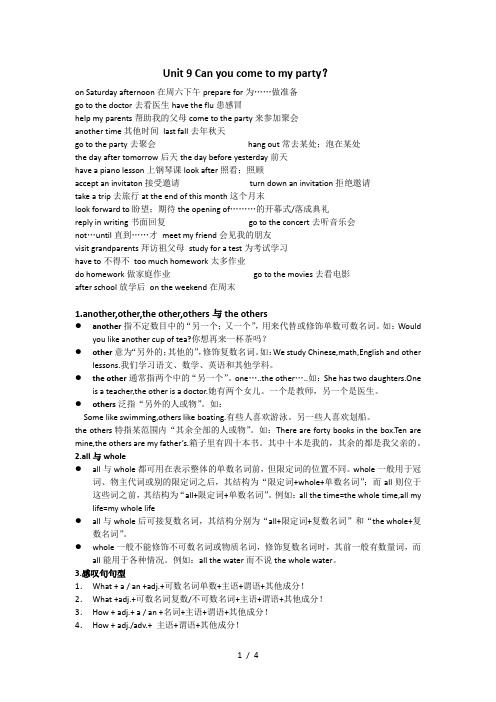
Unit 9 Can you come to my party?on Saturday afternoon在周六下午prepare for为……做准备go to the doctor去看医生have the flu患感冒help my parents帮助我的父母come to the party来参加聚会another time其他时间last fall去年秋天go to the party去聚会hang out常去某处;泡在某处the day after tomorrow后天the day before yesterday前天have a piano lesson上钢琴课look after照看;照顾accept an invitaton接受邀请turn down an invitation拒绝邀请take a trip去旅行at the end of this month这个月末look forward to盼望;期待the opening of………的开幕式/落成典礼reply in writing书面回复go to the concert去听音乐会not…until直到……才meet my friend会见我的朋友visit grandparents拜访祖父母study for a test为考试学习have to不得不too much homework太多作业do homework做家庭作业go to the movies去看电影after school放学后on the weekend在周末1.another,other,the other,others与the others●another指不定数目中的“另一个;又一个”,用来代替或修饰单数可数名词。
如:Wouldyou like another cup of tea?你想再来一杯茶吗?●other意为“另外的;其他的”,修饰复数名词。
新人教版八年级英语上册Unit_9_Can_you_come_to_my_party?__Section_A-1
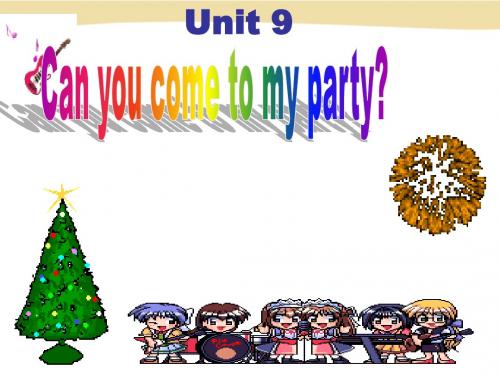
Sure, Joe. Thanks for asking.
2d Role-play the conversation.
Jeff: Hey, Nick, can you come to my house on
Saturday? My cousin Sam from Xi’an is
going to be here.
Sure, Joe. Thanks for asking.
Hey, Tom. Can you go to the movies on Saturday?
I’m sorry, I’m not available. I have to take part in the football match
That’s too bad. Maybe another time.
2a. Listen and circle can or can’t.
1. Jeff can/ can’t go to the party.
2. Mary can/ can’t go to the party. 3. May can/ can’t go to the party.
4. Mei Ling can/ can’t go to the party.
Jeff: That’s really too bad! Oh, but Sam isn’t
leaving until next Wednesday. Can you
hang out with us on Monday night?
Nick: Sure! Catch you on Monday!
Language points
Sure, I’d love to. I’m sorry, I can’t. I have to…
人教版英语八年级上册Unit 9《Can you come to my party》教学设计

人教版英语八年级上册Unit 9《Can you come to my party》教学设计一. 教材分析人教版英语八年级上册Unit 9主要讲述了关于邀请别人参加聚会的情境。
通过本单元的学习,学生能够掌握与聚会相关的词汇和表达方式,学会如何礼貌地邀请别人,并能够用英语进行简单的交流。
本单元的核心句型是“Can you come to my party?”,以及回答“Yes, I can.”和“No, I can’t.”。
二. 学情分析八年级的学生已经具备了一定的英语基础,能够听懂并运用简单的英语进行交流。
他们对学习英语有浓厚的兴趣,并且愿意积极参与课堂活动。
然而,部分学生可能在口语表达和听力方面还存在一定的困难,需要教师的引导和帮助。
三. 教学目标1.知识目标:学生能够掌握与聚会相关的词汇和表达方式,学会如何礼貌地邀请别人,并能够用英语进行简单的交流。
2.能力目标:学生能够听懂并运用核心句型“Can you come to my party?”进行交流,提高口语表达能力。
3.情感目标:学生能够在课堂上积极参与,培养合作意识和团队精神。
四. 教学重难点1.重点:学生能够听懂并运用核心句型“Can you come to my party?”进行交流。
2.难点:学生能够正确使用情态动词“can”来表达自己的能力。
五. 教学方法1.情境教学法:通过创设真实的聚会情境,激发学生的学习兴趣,提高他们的口语表达能力。
2.交际法:通过小组讨论和角色扮演等方式,培养学生的合作意识和团队精神。
3.任务型教学法:通过完成各种任务,引导学生主动参与学习过程,提高他们的自主学习能力。
六. 教学准备1.教学材料:教材、多媒体课件、录音机、磁带或音频文件。
2.教学环境:教室布置成聚会场景,悬挂气球、彩带等装饰物。
七. 教学过程1.导入(5分钟)教师以提问的方式引导学生回顾已学过的与聚会相关的词汇,如“birthday party”、“house party”等。
八年级英语上册 Unit 9 Can you come to my party?单元知识归纳
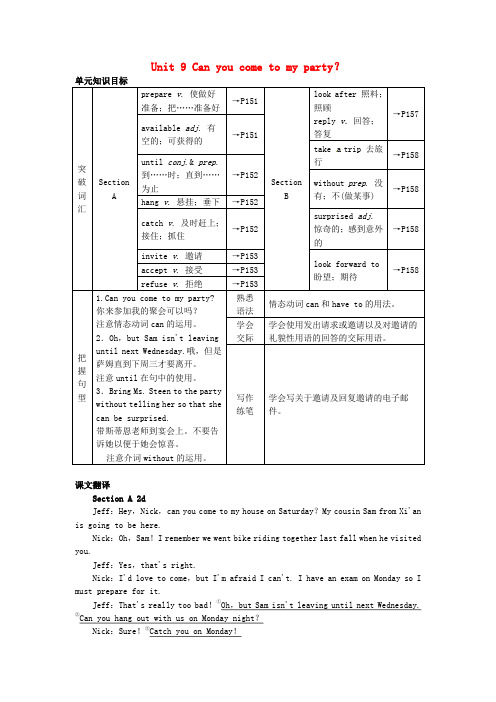
Unit 9 Can you come to my party?a课文翻译Section A 2dJeff:Hey,Nick,can you come to my house on Saturday?My cousin Sam from Xi'an is going to be here.Nick:Oh,Sam!I remember we went bike riding together last fall when he visited you.Jeff:Yes,that's right.Nick:I'd love to come,but I'm afraid I can't. I have an exam on Monday so I must prepare for it.Jeff:That's really too bad!①Oh,but Sam isn't leaving until next Wednesday.②Can you hang out with us on Monday night?Nick:Sure!③Catch you on Monday!杰夫:嘿,尼克,星期六你能来我家吗?我来自西安的表弟萨姆打算到这儿。
尼克:哦,萨姆!我记得去年秋天他来看你时,我们一起骑自行车旅行过。
杰夫:是的,很对。
尼克:我想去,但是恐怕不行。
星期一我有一次考试,所以我必须为此而准备。
杰夫:那真是太糟糕了!哦,但是萨姆直到下周三才要离开。
你可以在周一晚上和我们去闲逛吗?尼克:当然可以了!周一见你们!知识详解1.—Jenny,can you come to my party on Saturday afternoon?詹妮,星期六下午你能来参加我的聚会吗?—Sure,I'd love to.当然,我很愿意。
【解读】本句是一般疑问句。
新人教版八年级英语上册复习短语笔记资料Unit 9 Can you come to my party
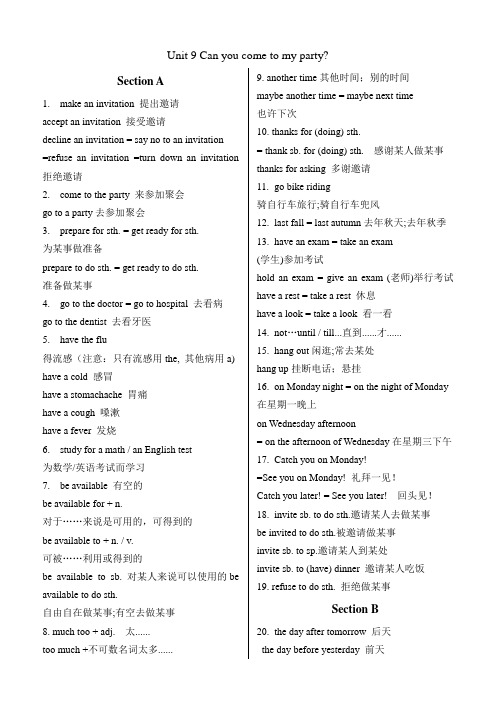
Unit 9 Can you come to my party?Section A1. make an invitation 提出邀请accept an invitation 接受邀请decline an invitation = say no to an invitation=refuse an invitation =turn down an invitation 拒绝邀请2. come to the party 来参加聚会go to a party去参加聚会3. prepare for sth. = get ready for sth.为某事做准备prepare to do sth. = get ready to do sth.准备做某事4. go to the doctor = go to hospital 去看病go to the dentist 去看牙医5. have the flu得流感(注意:只有流感用the, 其他病用a) have a cold 感冒have a stomachache 胃痛have a cough 嗓漱have a fever 发烧6. study for a math / an English test为数学/英语考试而学习7. be available 有空的be available for + n.对于……来说是可用的,可得到的be available to + n. / v.可被……利用或得到的be available to sb. 对某人来说可以使用的be available to do sth.自由自在做某事;有空去做某事8. much too + adj. 太......too much +不可数名词太多...... 9. another time其他时间;别的时间maybe another time = maybe next time也许下次10. thanks for (doing) sth.= thank sb. for (doing) sth. 感谢某人做某事thanks for asking 多谢邀请11. go bike riding骑自行车旅行;骑自行车兜风12. last fall = last autumn去年秋天;去年秋季13. have an exam = take an exam(学生)参加考试hold an exam = give an exam (老师)举行考试have a rest = take a rest 休息have a look = take a look 看一看14. not…until / till...直到......才......15. hang out闲逛;常去某处hang up挂断电话;悬挂16. on Monday night = on the night of Monday 在星期一晚上on Wednesday afternoon= on the afternoon of Wednesday在星期三下午17. Catch you on Monday!=See you on Monday! 礼拜一见!Catch you later! = See you later! 回头见!18. invite sb. to do sth.邀请某人去做某事be invited to do sth.被邀请做某事invite sb. to sp.邀请某人到某处invite sb. to (have) dinner 邀请某人吃饭19. refuse to do sth. 拒绝做某事Section B20. the day after tomorrow 后天the day before yesterday 前天the year before last year 前年last year 去年this year 今年next year 明年the year after next year 后年21. have a piano lesson 上钢琴课22. on weekdays = from Monday to Friday在工作日on weekends 在周末this weekend这个周末last weekend上个周末next weekend下个周末23. look after = take care of 照顾;照料look after sb. well = take good care of sb.好好照顾;好好照料24. help sb. with sth. = help sb. (to) do sth.帮助某人做某事with one ’ s help = with the help of sb.在某人的帮助之下help out (with sth.)帮助摆脱困境/克服困难help sb. out帮助某人解决问题或摆脱困境25. see sb. do sth.看到某人做了某事(强调看见某人做过某事)see sb. doing sth.看到某人正在做某事(强调看见某人正在做某事)26. take a trip = go on / for a trip 去旅行take a trip to sp. = go to sp. for a trip到某地去旅行27. at the end of... 在......的末端;在......的尽头at the end of this month 在这个月月底at the end of the road 在路的尽头28. be glad / happy to do sth.很高兴做某事29. by +时间点到......为止by now到现在为止by this Friday到这个星期五之前为止30. be surprised 感到惊讶be surprised at sth.对某事感到很惊讶be surprised to do sth.惊讶地做某事31. think of想出;想起;认为think about考虑;思考think over好好考虑;深思熟虑32. bring sb. / sth. to sp. 带某人/某物到某地33. so that 为了;以便34. look forward to doing sth.期待做某事;盼望做某事35. hear from sb. = get / receive a letter from sb. 收到某人的来信hear about / of sth. / sb. 听说某事/某人36. plan a housewarming party策划一个乔迁聚会plan a party for sb.为某人策划一个聚会have a surprise party办一场惊喜聚会;开惊喜聚会at the party在聚会上37. make it成功;胜利(表示通过努力或经历困难后取得成功、完成某事)38. reply in writing以书面的形式进行回复reply to these letters回复这些来信reply to the question=make a reply to the question=answer the question 回答问题39. go to a concert去听音乐会give a concert开音乐会40. go to the movies = go to see a film=go to the cinema 去看电影。
人教新目标八年级上册英语《Unit 9 Can you come to my party?》Sect
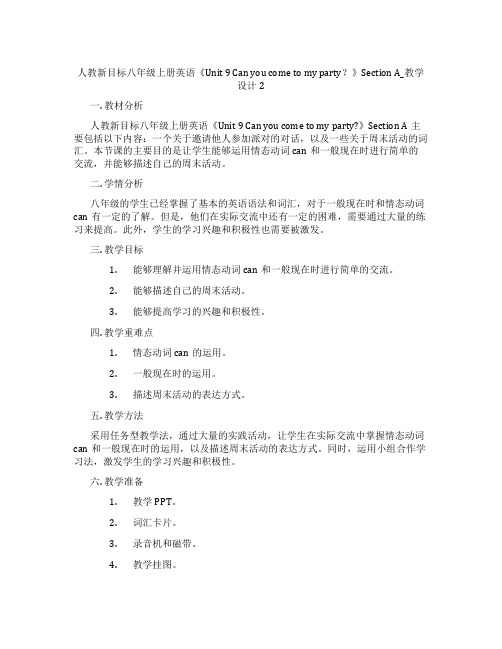
人教新目标八年级上册英语《Unit 9 Can you come to my party?》Section A_教学设计2一. 教材分析人教新目标八年级上册英语《Unit 9 Can you come to my party?》Section A主要包括以下内容:一个关于邀请他人参加派对的对话,以及一些关于周末活动的词汇。
本节课的主要目的是让学生能够运用情态动词can和一般现在时进行简单的交流,并能够描述自己的周末活动。
二. 学情分析八年级的学生已经掌握了基本的英语语法和词汇,对于一般现在时和情态动词can有一定的了解。
但是,他们在实际交流中还有一定的困难,需要通过大量的练习来提高。
此外,学生的学习兴趣和积极性也需要被激发。
三. 教学目标1.能够理解并运用情态动词can和一般现在时进行简单的交流。
2.能够描述自己的周末活动。
3.能够提高学习的兴趣和积极性。
四. 教学重难点1.情态动词can的运用。
2.一般现在时的运用。
3.描述周末活动的表达方式。
五. 教学方法采用任务型教学法,通过大量的实践活动,让学生在实际交流中掌握情态动词can和一般现在时的运用,以及描述周末活动的表达方式。
同时,运用小组合作学习法,激发学生的学习兴趣和积极性。
六. 教学准备1.教学PPT。
2.词汇卡片。
3.录音机和磁带。
4.教学挂图。
七. 教学过程1.导入(5分钟)通过播放一段关于派对的音频,引导学生谈论派对,激发学生的学习兴趣。
2.呈现(10分钟)利用PPT展示本节课的主要内容,包括对话和词汇。
让学生跟读对话,熟悉词汇。
3.操练(15分钟)将学生分成小组,每组分配一张词汇卡片,让学生用情态动词can和一般现在时进行交流,描述卡片上的词汇。
教师巡回指导,纠正发音和语法错误。
4.巩固(10分钟)让学生在小组内互相提问,用情态动词can和一般现在时描述自己的周末活动。
教师巡回指导,纠正发音和语法错误。
5.拓展(10分钟)让学生自由发挥,用情态动词can和一般现在时编写一段对话,描述自己和他的朋友的周末活动。
Unit9Can you come to my party 词汇及情态动词讲解-人教版八年级英语上册

1. —____________ I try on those shoes in the window?
—_______________. They are just on show.
A. Could; Yes, you can
B. Can; Sorry, you couldn’t
number.
—Sure. Here it is.
A. Can
B. Need
C. Might
D. Must
Must提问时的否定回答
—Must I go home now? —Yes, you must.
needn’t. No, you
don’t have to. Must提问时否定回答 用 needn’t 或 don’t/doesn’t have to.
Unit 9 Can you come to my party?
词汇及情态动词讲解
词汇 练习 语法 综合练习
目录
1. invite v. 邀请 invitation n. 邀请 invite sb. to do sth. 邀请某人做某事
Eg: Hehua invites us to watch the soap opera. Guo invited Qin to drink, but he turned him down..
Task 2 单选
( ) 1.Julie didn't leave office _____the police arrived.
A. however B. whenever C. while D. until
( ) 2.My friend invited me _____the art club, and I
人教版八年级英语上册unit 9 Can you come to my party单词讲解课件

refuse /rɪ'fju:z/ v.拒绝
refuse sb. refuse to do sth.
拒绝 yesterday 前天
the day after tomorrow 后天
weekday /ˈwi:kdeɪ/ n.工作日 (星期一至星期五的任何一天)
一封邀请函
an invitation
an invitation to … turn down 拒绝
……的邀请 还可指“调低(音量)”
turn down an invitation
reply /rɪ'plaɪ/ v.回答;回复
reply to sb. reply to sth.
回复sb. 回应sth.
Unit 9 Can you come to my party?
单词讲解
prepare for 为……做准备
= get/be ready for
exam /ɪɡ'zæm/ n.(=examination)考试
一场考试
an exam
have/take an exam 参加考试
pass the exam
hang /hæŋ/ v.(hung /hʌŋ/)悬挂;垂下
Hang the picture on the wall,please.
hang out 闲逛;常去某处 hang out with friends 和朋友一起闲逛 hang 用作动词 “吊死,绞死”时,其过去式为hanged
catch /kætʃ/ v.及时赶上;接住 ;抓住 第三人称单数:catches 过去式:caught Catch you tomorrow.=See you tomorrow. 明天见。
Unit9-Can-you-come-to-my-party公开课教案

Unit 9 Can you come to my party?The first and second periodsSection A (1a-2d)I. Teaching aims1.Knowledge and ability①Master the new words and phrases.②Master the target language.Learn to talk about the invitation.2. Precess and method①Do some listening practice.②Let Ss work in pairs to learn the cooperative.3.Emotion,attitude and valueLet Ss know it’s polite to refuse one’s invitation if you can’t go.II. Teaching important and difficult points1.Master the key words and expressions.2.Master the target language.3.Teach Ss how to make invitation.III . Teaching proceduresStep1. Lead-in1. 在大屏幕上向学生展示一张邀请函。
T: Hello, everyone! Yesterday I received an invitation letter from my dear friend; she invited me to g o to her Halloween party. But I have something important to do. I’m studying for a test. I don’t know what to do. What should I say? Can you help me? … 2. Ss try to answer the questions.Step2. Presentation1. 引导学生们看大屏幕上邀请及两个答语。
八年上Unit 9 Can you come to my party单词短语语法听写

Unit 9 Can you come to my party?(单词听写和语法翻译) 一、单词听写1._____________________v.预备;准备2.____________________ 为……准备3.____________________ 考试4.____________________去看医生5.____________________n. 流感6.____________________ 可得到的;有空的;7.____________________ 其他时间,别的时间8.____________________ 在…以前;直到…时prep.在…以前;到…为止9.____________________悬挂;(使)低垂10.____________________常去某处;泡在某处11.____________________ 赶上;抓住;捕捉12.____________________邀请13.____________________接受;14.____________________ 拒绝15.____________________ 前天16.____________________后天17.____________________n. 平日,工作日18.____________________照顾,照料19.__________________ 邀请;邀请函20.____________________减小,关小,调低21.____________________回答,回复22.____________________ 转交;发送,向前的23.____________________ 删除24.____________________n. 印记vt. 印刷;打印;25.____________________adj. 难过的;悲哀的,令人26.____________________ int. 再见27.____________________ 去旅行28.____________________adj. 高兴的;乐意的;令人高兴的;灿烂美丽的vt. 使高兴29.help out 分担工作,解决问题30.____________________准备,准备工作31.____________________vt. 粘合;似胶般固着于n.胶;各种胶合物32.____________________prep. 没有;超过;在…外面adv. 户外;在外面;33.______________ _ adj. 感到惊讶的,出人意料的34.____________________ 盼望,期待35.____________________ 收到......来信36.____________________ n. 乔迁庆宴37.____________________开幕式,落成典礼38.____________________音乐会39.__________________ 校长40.____________________大事,公开活动41.____________________ 客人42.____________________日历,日程表43.____________________n. 日间,白天二、词组短语记忆1.____________________ come to my party2.____________________ on Saturday afternoon3.____________________ prepare for4.____________________ go to the doctor5.____________________ have the flu6.____________________help my parents7.____________________ come to the party8.____________________ another time9.____________________ last fall10.____________________ go to the party11.____________________ hang out12.____________________ the day after tomorrow13.____________________ the day before yesterday14.____________________ have a piano lesson15.____________________ look after16.____________________ accept an invitation 17.____________________ turn down an invitation18.____________________ take a trip19.___________________ at the end of this month20.____________________ look forward to21.____________________the opening of…22.____________________ reply in writing23.____________________ go to the concert24.____________________ not…until25.____________________ meet my friend26.____________________ visit grandparents27.____________________ study for a test28.____________________have to29.____________________ too much homework30.____________________ do homework31.____________________ go to the movies32.____________________ after school33.____________________ on the weekend34.____________________ invite sb. to do sth.35.what引导的感叹句结构:What+a/an+adj.+可数名词单数(+主语+谓语)!36.What+adj.+名词复数/不可数名词(+主语+谓语)!37.__________________help sb.(to)sth. /help sb with sth38.____________________ be sad to do sth39.____________________see sb.do/doing sth. 40.____________________ see sb.doing sth.41.____________________ the best way to do sth.42.____________________have a surprise party for ...43.____________________ look forward to doing sth.44.____________________ reply to sth./sb.45.____________________?What’s today?46.____________________? What’s the date t oday?47.____________________? What day is it today?三、语法翻译1.星期六你能到我的派对来吗?——————————————————————————————————————————————?2.当然能,我很愿意去。
Unit 9 Can you come to my party_教学设计

Unit 9 Can you come to my party?Goals● To learn to use can for invitations, modal have to, present progressive as future for plannedactions ● To make, accept and decline invitation ● To talk about obligation ProceduresWarming up by learning grammar ●What are Modal Verbs?Modal verbs are special verbs which behave very differently from normal verbs. Here are some important differences:1. Modal verbs do not take "-s" in the third person. EXAMPLES:He can speak Chinese.She should be here by 9:00.2. You use "not" to make modal verbs negative, even in Simple Present and Simple Past. EXAMPLES:He should not be late.They might not come to the party.3. Many modal verbs cannot be used in the past tenses or the future tenses. EXAMPLES:He will can go with us.NOT CORRECTShe musted study very hard. NOT CORRECT(Requests usually refer to the near future.) (Requests usually refer to the near future.)have to necessity 1. She has to read four books forthis literature class.2. She had to finish the first bookbefore the midterm.3. She will have to finish the otherbooks before the final exam.1. She doesn't have to read "Grapes ofWrath." It's optional reading for extracredit.2. She didn't have to write a critique of"The Scarlet Letter." She had to give apresentation to her class.3. She won't have to take any otherliterature classes. American Literature 101is the only required course.mustdon't have tochoice/no obligation 1. I don't have to take any tests. The course is just for fun.2. I didn't have to take the test. The teacher let me do a report instead.3. I won't have to take the test. It's going to be for extra credit and I don't need the points.Warming up by talking about the partyHello, everyone!Today we shall take up unit 9. The title of this unit is that Can you come to my party?Do you like parties? I think most of you will say,” Yeah”. At the party we have lots of fun eating, drinking, singing, dancing and talking. And we can also make new friends. But how do you answer when someone asks you to take part in a party? If you want to go to the party,you can say,” Sure, I’d love to.” If you have to do some other things at the same time, you can say,“I’m sorry. I have to -----.”Please look at the blackboard and re ad after me the targetCan you come to my party?----Sure, I’d love to.Can you come to my party?---I’m sorry. I have to study for a test.an invitation the first time it is offered. In such placespeople usually thank the person but do not give adefinite answer at that time. But in the United Statesit is polite to accept or refuse an invitation the first time it is offered. Also, Americans usually give a reason when they have to say no to an invitation. 1A: Matching the words with the picturesPlease look at the picture. The boy in the middle will hold a party. Caneveryone come to the party? Each thought bubble shows a person doingsomething. Please tell me what you see in each scene. And then look at theblackboard and check you answer.prepare for an exam, help my parents, go to the doctor, meet my friend, have the fluLet’s check the answers.1b Listening and writingYou are great! As you see, there are some people in the picture. Do you know who’s who? Now please listen to the conversation. Especially li sten to Sun Ning’s words carefully. He says the names of each person he is inviting. When I play the recording for the first time, you just listen carefully. When I play the recording for the second time, please write the names of each person next to his o r her picture. You have to complete the activity individually. OK, now let’s check the answers.Read the tapescript to underline the expressions and shaow the c an for invitations, modal have to and present progressive as future, for planned actions.1c Practicing oral English using the languageNow please make your own dialogues in groups of four. Suppose you are the students in the picture. One of you is students A inviting the other three students to your party. The other studentsA: Can you come to my party on Saturday afternoon?B:Sure. I’d love to.C: Sorry, I can’t. I have to prepare for an exam.D: I’m sorry, too. I have to go to the doctor.and pronunciation support if you need.2a Listening and understandingPlease look at these five sentences, and read them. The first time saycan and the second time say can’t. Do you know which one is correct?Let’s listen to the tape. There are five conversations numbered 1 to 5.In each conversation the person says he can or he can’t come to the party. Listen to each conversation carefully and circle the word that makes the sentences correct. For example, the word can’t have a circle around it in sentence1. So sentence1 is Jeff can’t come to the party. I will play the recording twice. First time you just listen carefully and the second time please circle can or can’t.Ok, let’s check the answer2b ListeningYou have heard the conversations twice and have got to know who can come to the party and who can’t come to the party. But why can’t those three persons come? Here are five reasons. Which are correct ones? Please listen to the tape again and write the number of the conversation (1 to 3) in front of the reasons. Two of them are not in the recording. These two have no answer. Listen again and check your answers.●To learn the new words: today, tomorrow, the day after tomorrowProcedures1aWriting the datesWelcome back to the English class. Do you know what day is it today? Yes, it is Wednesday today. And today we will study Section B. Please look at the top of the calendarin your book and read these words aloud. Do you remember them?(Sunday, Monday, Tuesday, Wednesday,Thursday, Friday, Saturday)Good! Look at the blackboard please. Here is a current calendar. Mary, please point out today’s date. Yes, it’s 12th October. What about the other dates of this week? Now please copy theseSunday the 9th Mondaythe 10thTuesdaythe 11thWednesdaythe 12thThursdaythe 13thFridaythe 14thSaturdaythe 15th.1b Writing daysPlease look at the calendar again. As you see, today is Wednesday the 12th. Look at the box on the Today, tomorrow, yesterday, the day after tomorrow, weekdaySunday the 9th Mondaythe 10thTuesdaythe 11thWednesdaythe 12thThursdaythe 13thFridaythe 14thSaturdaythe 15th weekday yesterday today tomorrow the dayaftertomorrowagainst those on the board.1c Doing pairwork and playing gamesNow look at the dialogue in 1c. Tom and Tim please read it to the class aloud. Then make the similar dialogue in pairs. One student points to a date and asks,What’s today?The other one answers, It’s (Monday) the (10th).After finishing practicing, let’s play the game of s peed. Please look at the calendar on the board and listen carefully. When I point to a date on the calendar and say yesterday,today and tomorrow,I’ll say a student’s name. This student has to respondwithin five seconds with the correct date. For example, if I say (yesterday) andpoint to (Wednesday, the 12th) this student has to say, (It’s Tuesday, the 11th).Now let’s play this game and see how fast you can respond with correct answers. Let’s find who the champion is.2a Make a list of the kinds of parties people have.2b Skim the message below. Why did the people write them? Match the reason with each message below.1. accept an invitation2. make an invitation3. turn down an invitation。
Unit9Canyoucometomyparty.教案

Unit9Canyoucometomyparty.教案Unit9 Can you come to my party?1.会使⽤句型“Can you...?”发出邀请;会运⽤“Sure,I d love to.That sounds great!”等句⼦接受邀请;会⽤“Sorry,I can t.I must/have to...Sorry.He/She has to/ must...”等句⼦委婉地拒绝邀请。
2.采⽤听⼒训练、⼩组对话、分⾓⾊表演、制作调查表格等⽅式来巩固⽇常⽤语;通过看图、找关键词等阅读策略培养阅读能⼒。
3.通过学习本单元的内容,了解英美国家举办聚会的习俗,了解举办聚会的基本步骤;通过送别⽼师和朋友,学会感恩⽼师、珍惜友谊。
Section A(1a~1c)●课时重点:1.会使⽤句型“Can you...?”来邀请别⼈,并能恰当地接受或委婉地拒绝他⼈的邀请。
2.会运⽤⼀些相关的动词短语来表达拒绝的理由。
⼀、填⼀填1.来参加我的晚会come to my party2.为考试做准备prepare for an exam3.去看医⽣go to the doctor4.得流感have the flu⼆、译⼀译1.Can you come to my party on Saturday afternoon?周六下午你能来参加我的聚会吗?2.Sure,I d love to.当然,我很乐意。
3.I have to prepare for an exam.我得为考试做准备。
4.I must go to the doctor.我必须去看医⽣。
活动⼀1.完成教材上的1a,把动词短语和相对应的图⽚进⾏匹配,并在⼩组⾥核对答案。
2.听教材上1b的录⾳第⼀遍,把下列名字:Tim,Kay,Anna,Wilson写在图中正确图⽚的横线上。
3.听录⾳第⼆遍,写出四个同学的邀请回答。
Tim:Kay:Anna:Wilson:活动⼆在⼩组⾥先仿照例⼦编对话,然后分⼩组进⾏展⽰。
八年级上册unit9 can you come to my party
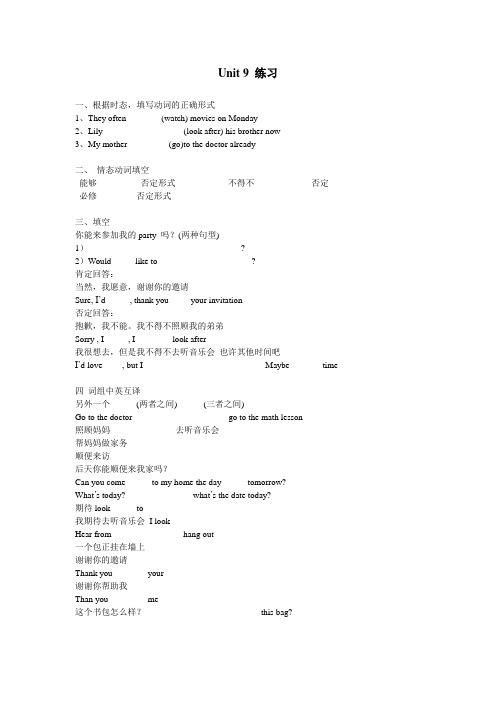
Unit 9 练习一、根据时态,填写动词的正确形式1、They often________(watch) movies on Monday2、Lily __________________(look after) his brother now3、My mother _________(go)to the doctor already二、情态动词填空能够_________ 否定形式________ 不得不_____________否定___________ 必修_________否定形式_________三、填空你能来参加我的party 吗?(两种句型)1)___________________________________?2)Would _____like to _____________________?肯定回答:当然,我愿意,谢谢你的邀请Sure, I’d _____, thank you ____ your invitation否定回答:抱歉,我不能。
我不得不照顾我的弟弟Sorry , I _____, I ________look after____________我很想去,但是我不得不去听音乐会也许其他时间吧I’d love ____, but I ___________________________ Maybe _______time四词组中英互译另外一个______(两者之间)______(三者之间)Go to the doctor____________________ go to the math lesson__________________ 照顾妈妈______________ 去听音乐会_________________________________帮妈妈做家务_____________________________________________________顺便来访________________________后天你能顺便来我家吗?Can you come _____ to my home the day _____ tomorrow?What’s today?_______________ what’s the date today?__________________期待look _____ to我期待去听音乐会I look ___________________________________________ Hear from________________ hang out____________________一个包正挂在墙上______________________________________________谢谢你的邀请Thank you _______ your ________谢谢你帮助我Than you ________ me这个书包怎么样?__________________________ this bag?。
人教版英语八年级上册Unit 9听力原文及翻译
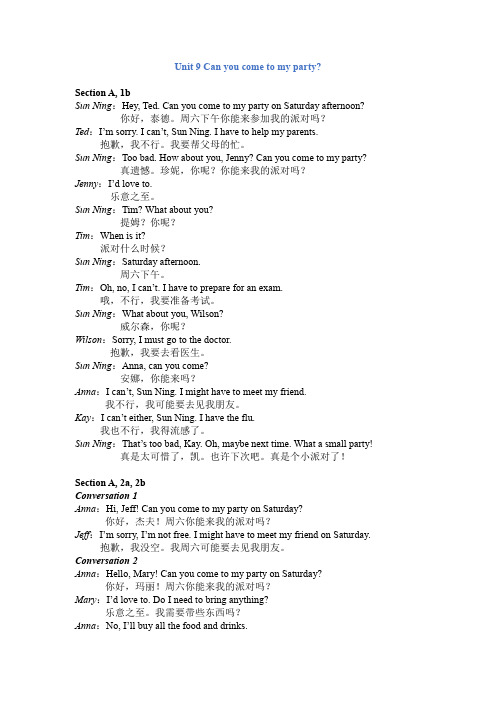
Unit 9 Can you come to my party?Section A, 1bSun Ning:Hey, Ted. Can you come to my party on Saturday afternoon?你好,泰德。
周六下午你能来参加我的派对吗?Ted:I’m sorry. I can’t, Sun Ning. I have to help my parents.抱歉,我不行。
我要帮父母的忙。
Sun Ning:Too bad. How about you, Jenny? Can you come to my party?真遗憾。
珍妮,你呢?你能来我的派对吗?Jenny:I’d love to.乐意之至。
Sun Ning:Tim? What about you?提姆?你呢?Tim:When is it?派对什么时候?Sun Ning:Saturday afternoon.周六下午。
Tim:Oh, no, I can’t. I have to prepare for an exam.哦,不行,我要准备考试。
Sun Ning:What about you, Wilson?威尔森,你呢?Wilson:Sorry, I must go to the doctor.抱歉,我要去看医生。
Sun Ning:Anna, can you come?安娜,你能来吗?Anna:I can’t, Sun Ning. I might have to meet my friend.我不行,我可能要去见我朋友。
Kay:I can’t either, Sun Ning. I have the flu.我也不行,我得流感了。
Sun Ning:That’s too bad, Kay. Oh, maybe next time. What a small party!真是太可惜了,凯。
也许下次吧。
真是个小派对了!Section A, 2a, 2bConversation 1Anna:Hi, Jeff! Can you come to my party on Saturday?你好,杰夫!周六你能来我的派对吗?Jeff:I’m sorry, I’m not free. I might have to meet my friend on Saturday.抱歉,我没空。
八年级英语上册 Unit 9 Can you come to my party短语、语法知识点汇总 (新版)人教新目标版
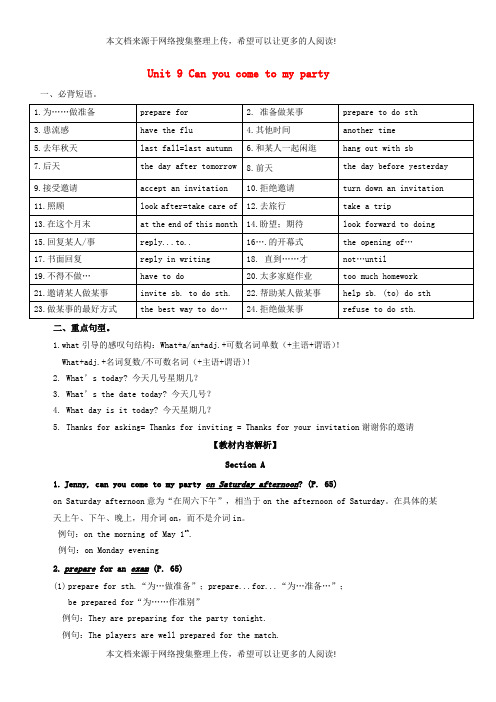
Unit 9 Can you come to my party一、必背短语。
二、重点句型。
1.what引导的感叹句结构:What+a/an+adj.+可数名词单数(+主语+谓语)!What+adj.+名词复数/不可数名词(+主语+谓语)!2. What’s today?今天几号星期几?3. What’s the date today?今天几号?4. What day is it today? 今天星期几?5. Thanks for asking= Thanks for inviting = Thanks for your invitation谢谢你的邀请【教材内容解析】Section A1.Jenny, can you come to my party on Saturday afternoon? (P. 65)on Saturday afternoon意为“在周六下午”,相当于on the afternoon of Saturday。
在具体的某天上午、下午、晚上,用介词on,而不是介词in。
例句:on the morning of May 1st.例句:on Monday evening2.prepare for an exam (P. 65)(1)prepare for sth.“为…做准备”;prepare...for...“为…准备…”;be prepared for“为……作准别”例句:They are preparing for the party tonight.例句:The players are well prepared for the match.(2)exam作名词,表示“考试”,take/have an exam参加考试。
例句:We will take the final exam next week.3.I’m sorry. I’m not available. (P. 66)available作形容词,表示“有空的、可利用的”,常用作表语,相当于free。
(完整word版)人教版人教版八年级上册英语第九单元Unit9Canyoucometomyparty
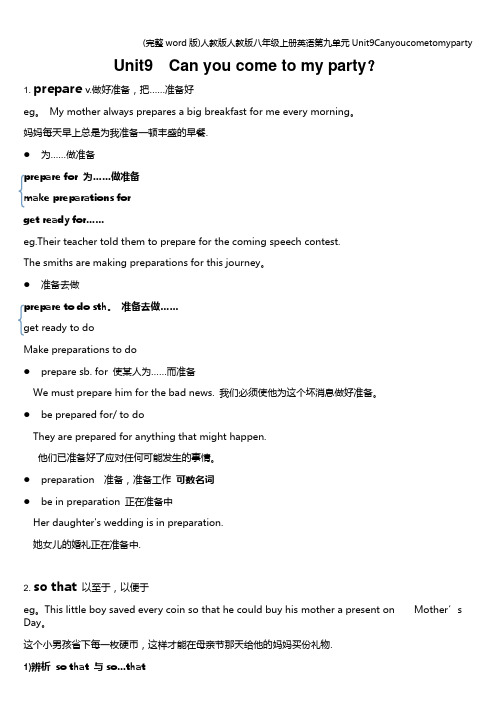
Unit9 Can you come to my party?1. prepare v.做好准备,把……准备好eg。
My mother always prepares a big breakfast for me every morning。
妈妈每天早上总是为我准备一顿丰盛的早餐.●为……做准备prepare for 为……做准备make preparations forget ready for……eg.Their teacher told them to prepare for the coming speech contest.The smiths are making preparations for this journey。
●准备去做prepare to do sth。
准备去做……get ready to doMake preparations to do●prepare sb. for 使某人为……而准备We must prepare him for the bad news. 我们必须使他为这个坏消息做好准备。
●be prepared for/ to doThey are prepared for anything that might happen.他们已准备好了应对任何可能发生的事情。
●preparation 准备,准备工作可数名词●be in preparation 正在准备中Her daughter's wedding is in preparation.她女儿的婚礼正在准备中.2. so that以至于,以便于eg。
This little boy saved every coin so that he co uld buy his mother a present on Mother’s Day。
这个小男孩省下每一枚硬币,这样才能在母亲节那天给他的妈妈买份礼物.1)辨析so that 与so…thatso that 表示目的(多) 表结果She worked hard so that everything would be ready in time。
- 1、下载文档前请自行甄别文档内容的完整性,平台不提供额外的编辑、内容补充、找答案等附加服务。
- 2、"仅部分预览"的文档,不可在线预览部分如存在完整性等问题,可反馈申请退款(可完整预览的文档不适用该条件!)。
- 3、如文档侵犯您的权益,请联系客服反馈,我们会尽快为您处理(人工客服工作时间:9:00-18:30)。
学习收获
(完成目标)
我的收获:
共享资源:
学习困惑
(需要帮助)
我的困惑:
解决办法:
星级评价
(数字+★)
项目
自我评价
学对互评
互助评价
教师抽评
家长评价
星级
签名
时间
1:板写,(每学团由2人上板默写:1人写单词,1人写短语,)
2:笔记本写(其余4人在团内写)
3:在板上板写单词的同学,回座位默写文本;在板上板写文本的同学,回座位默写单词!
特别提示:在默写之前,团员要将笔记本教由英语团长签字:(团长名字,当日日期,全英语)
特别提示:在默写之前,团员要将笔记本教由英语长签字:(团长名字,当日日期,“全英语”)
4:meet my friend接见我的朋友
5:have the flu发烧
6:another time其他时间,别的时间
活动3:文本展演:模仿1c进行展演,(抢答式展演)
1:发出邀请与接受邀请,可以运用1a的短语进行编对话
2根据1c文模块进行学团文本展演
特别提示:
不能带课本,可以背诵,表演,对话,采访等等。
知识连接:
一、用Can发出邀请及它的回答
1:Can you…?表邀请的句子的肯定和否定回答
Eg:Can you go shopping with me?(你能和我一起去购物吗)
Sure, I′d love to./Sorry , I can′t. I have to
…
二:have to /has to与must的区别
仁怀市城南中学课程改革英语科学案
初备人:袁巧香备课组:共备时间:2014年8月26日审印人:
课题
Unit9:Can you come to my party?1a-2c第一课时
课型:
听说课
展学课
★1:能听说读写1a-2c的新单词,新短语
★★:1:能用can引导的句子发出邀请
★★★1:培养学生礼貌用语的习惯和学习外国文化
请仔细观察下面几个句子,你能看出have to的用法吗?
I have to help my parents.
He has to study for a test.
I must go home. I have much homework to do.
It is raining. I have to go home.
学习流程
任务分工
主要方法
学习流程:1:默写本部分1a-2c新单词2:默写文本默写1c,2c3:文本展讲4:文本展示5:文本抽问式解答
任务分工:临时抽学团,学员进行文本默写,展讲,展示
主要方法:背单词,背文本,查课本注释P91,查资料,学团进行帮扶等等
学习
程序
学习活动
学法指导
活动1:1:默写文本:新单词1a-2c:(10个新单词,);文本:1a(5个动词短语),
Have to /has to后面要接_____汉语意思是________强调(主观/客观)原因。而must意为“必须,”强调(主观/客观)原因。
特别提示:
一:短语
1:prepare for an exam为考试做准备
2:help my parents帮助父母
3:go to the doctor去看病
7.错一个单词扣1分,短语扣2分,句子扣3分,批改后90分以下交由团长登记扣分,满分为100分)
活动2:文本展讲:1a.1c and 2c
1:(展讲时由每学团的1,2号讲解新单词;3,4号讲解短语;5,6好讲解句子和语法,并提问,)
2:学团进行抢答式讲解,(学团内进行分层次讲解:新单词,新短语,新句子,新语法,其它学团可以进行问题式提问,被抽到的学团成员享有优先补充的权利,然后其它学团再进行补充)
活动4:文本抽问式解答
1:1a的图片与短语的配对每一个同学要提前先做
2:而1b,2a,2b只能在家听(至少听5遍,不能写,只能在课堂上听了之后才能写,)
3:在听到听力材料所填信息时,不要填完信息,只填首字母,听完后再补充完整
4:完成1a的图片配对,完成1b,2a,2b的听力材料所缺信息,(在听听力前要先做好2分钟的阅读,)
1.提前用笔记本写好单词:音标,意思,词性,短语意思
2.板写的同学团之间进行“串联式”(1团给2团改,2团给3团,以此类推)批改
3.笔记本默写的同学在学团内对改,
4.注意用双色笔:书写时用白色粉笔或黑色中性笔,批改时用红色笔,
5.正确的用红笔打钩,错误的圈起来,并用英语写上日期,6.对新单词,新短语进行标示:单词用红色笔圈,短语用红色笔划,
5:完成2c
作文荟萃:根据2a,2b所听信息写一篇小短文(课后完成:根据Jeff, Mary,May, Mei Ling, Paul的活动来写:为什么能去参加聚会,为什么不能去参加聚会)Jeff _____ can’t go to the party, because he has to ______….
